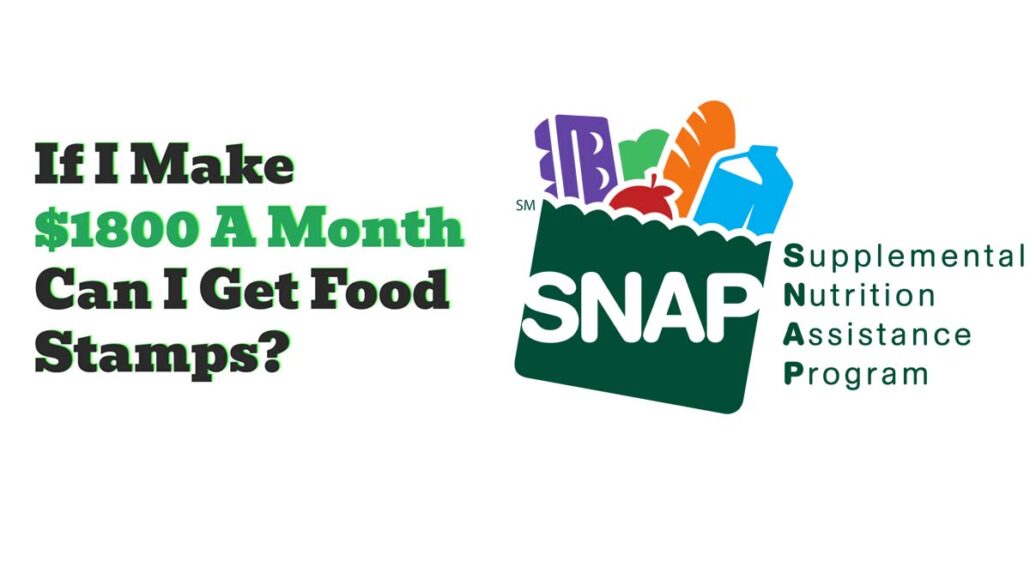If I Make $1800 a Month Can I Get Food Stamps? Unsure if $1800 monthly income qualifies you for food stamps? Learn the SNAP eligibility rules for income, household size, and deductions to see if you qualify.

Getting enough nutritious food on the table can be a challenge, and food stamps, also known as the Supplemental Nutrition Assistance Program (SNAP), can be a lifesaver for many families and individuals. But with an income of $1,800 a month, you might wonder if you qualify. Here’s a comprehensive guide to help you understand SNAP eligibility based on your income and other factors.
Understanding SNAP Eligibility
The SNAP program is a crucial resource for low-income individuals and families struggling to afford groceries. While income is a major factor, it’s not the only one. Here’s a breakdown of key eligibility criteria:
- Gross Income: This refers to your total income before taxes and deductions.
- Net Income: This is your gross income minus allowable deductions, such as work-related expenses or child support payments. Net income plays a more significant role in determining eligibility.
- Household Size: The number of people living in your household directly affects the income limits.
Income Limits and Your $1,800 Monthly Income:
The good news is that income limits for SNAP vary depending on household size. Here’s a table outlining the national gross income limits for 2024 (source: USDA Food and Nutrition Service):
| Household Size | Maximum Gross Monthly Income |
| 1 person | $2,070 |
| 2 persons | $2,790 |
| 3 persons | $3,510 |
| 4 persons | $4,230 |
| Each additional person | +$720 |
Can You Get Food Stamps with a $1,800 Monthly Income?
Based on the table above, if you live alone and make $1,800 a month (gross income), you might be eligible for SNAP benefits depending on your net income after allowable deductions. Let’s explore some scenarios:
- Scenario 1: If you have minimal deductions and your net income falls below $1,656 (80% of the gross income limit for a single person), you’d likely qualify for SNAP benefits.
- Scenario 2: With significant deductions that bring your net income under the 80% threshold, eligibility becomes more likely.
Net Income and Deductions:
Even if your gross income falls within the limit for your household size, deductions can further affect your eligibility. Here are some common allowable deductions:
- Standard deductions based on household size
- Shelter costs (rent/mortgage, utilities)
- Dependent care costs
- Medical and disability expenses
Calculating your net income after deductions can be crucial. The official SNAP website provides a helpful eligibility assistant tool (https://www.fns.usda.gov/snap/recipient/eligibility) to estimate your eligibility based on your specific circumstances.
Other Eligibility Considerations
- While income plays a significant role, other factors can influence SNAP eligibility:
- Assets: Having limited resources like savings or investments might not disqualify you, but strict asset limits apply.
- Citizenship/Immigration Status: U.S. citizens and qualified immigrants can apply.
- Student Status: Students may have specific eligibility requirements.
Taking the Next Step
If, after reviewing the information, you believe you might qualify for SNAP benefits, here are your next steps:
- Contact your local SNAP office: They can guide you through the application process and answer any specific questions.
- Use the online SNAP eligibility tool: This tool provides a preliminary assessment based on your information (https://www.fns.usda.gov/snap/recipient/eligibility).
FAQs on SNAP Eligibility
What other factors affect eligibility?
In addition to income, citizenship status, asset limits, and work requirements may also play a role.
What documents do I need to apply?
You’ll typically need proof of income, residency, and household composition documents.
How much in benefits can I expect?
The amount of SNAP benefits you receive depends on your income, household size, and deductions.
I make slightly more than the gross income limit. Can I still qualify?
Maybe. Deductions can significantly lower your net income and potentially make you eligible.
What if I have medical bills?
Medical expenses exceeding $35 per month for qualifying individuals can be deducted from your gross income.
How much in SNAP benefits can I expect to receive?
The amount varies depending on your income, household size, and deductions.
Conclusion
Understanding SNAP eligibility can be confusing, but hopefully, this guide has empowered you with the knowledge to determine if your $1,800 monthly income falls within the range for potential benefits. Remember, additional factors come into play, so don’t hesitate to reach out to your local SNAP office for a personalized assessment.
Check Out

